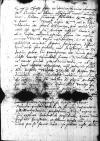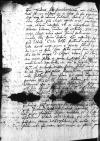Tametsi antea Reverendissimae Celsitudinis Vestrae iussu ⌊Tridentum⌋ iter facere destinaram, quo certius et citius ipse reverendissimo domino ⌊archiepiscopo Upsalensi⌋ litteras a Reverendissima Celsitudine Vestra missas redderem, tamen, cum iter meum omnino ⌊Viennam⌋ versus instituissem et eo usque optatissimo comitatu stipatus pervenissem, difficillimum mihi fore putavi inde ⌊Salisburgum⌋ ac Tridentum petere, cui grandissimos nec minus periculosos ⌊montes⌋ incumbere scirem. Verum tamen ne montes quidem, quantumvis ardui, me ab itinere semel instituto revocassent, nisi nuntius quidam tum temporis ⌊Tridento⌋ ⌊Viennam⌋ ad ⌊regem Ferdinandum⌋ missus nuntiasset nondum ⌊concilium⌋ esse coeptum neque sibi constare de quopiam archiepiscopo, qui illic ageret. Quare, credens ⌊illum⌋ ⌊Venetiis⌋ esse, iter institutum sine mora prosecutus 16 Februarii paper damaged⌈[ruarii]ruarii paper damaged⌉ Ve paper damaged⌈[Ve]Ve paper damaged⌉netias ap paper damaged⌈[p]p paper damaged⌉puli, ubi [...] paper damaged⌈[...][...] paper damaged⌉us apud q[...] paper damaged⌈[...][...] paper damaged⌉ [...] paper damaged⌈[...][...] paper damaged⌉quirerem, ubi a[...] paper damaged⌈[...][...] paper damaged⌉, ne nomen quidem Upsalensis se audisse aiebant.
Postremo quosdam nobiles ex familia ⌊imperatoris⌋ postridie ⌊Tridentum⌋ profecturos conveni, rogans, an quid explorati haberent de ⌊praesule illo⌋. Quorum unus singularem honestatem et summam constantiam cum gravitate prae se ferens dixit se quidem nosse archi AAWO, AB, D. 70, k. 244vepiscopum ⌊Tridenti⌋ sibi familiarissimum nomine ⌊Olavum⌋, verum sibi non constare, an is esset, de quo quaererem. Ego vero, de nomine dubitans, statim a latere exteriore charta, quae alioqui attrita erat, parumper remota oblique introspexi. Ubi ex inscriptione nomen convenire viderem, eundem esse respondi, etiam atque etia hidden by binding⌈[a]a hidden by binding⌉m orans alioqui ultro operam suam pollicentem, ne gravaretur illas secum deferre. Qui respondit non esse hidden by binding⌈[e]e hidden by binding⌉, quod dubitem superinscribed in place of crossed-out s⌈smm superinscribed in place of crossed-out s⌉.
AAWO, AB, D. 70, k. 244vepiscopum ⌊Tridenti⌋ sibi familiarissimum nomine ⌊Olavum⌋, verum sibi non constare, an is esset, de quo quaererem. Ego vero, de nomine dubitans, statim a latere exteriore charta, quae alioqui attrita erat, parumper remota oblique introspexi. Ubi ex inscriptione nomen convenire viderem, eundem esse respondi, etiam atque etia hidden by binding⌈[a]a hidden by binding⌉m orans alioqui ultro operam suam pollicentem, ne gravaretur illas secum deferre. Qui respondit non esse hidden by binding⌈[e]e hidden by binding⌉, quod dubitem superinscribed in place of crossed-out s⌈smm superinscribed in place of crossed-out s⌉.
Cuius dictis facillime acquiescens me inde ⌊Romam⌋ recepi, quam 5 Martii salvus (gratia Deo) et, ut spero, satis felici omine sum ingressus. Eo die non contigit dominum ⌊Casparum⌋ videre, sed altero, statim mane facto, in ponte Sancti Angeli seu Hadriani ambulantem deprehendi. Cui omnia et singula, utut a Reverendissima Celsitudine Vestra mihi tradita fuere, fideli manu reddidi hidden by binding⌈[di]di hidden by binding⌉. ⌊Is⌋ me summa, qua potuit, benevolentia accepit neque mihi hactenus suam fidem et operam impendere gravatus est, omnem movens lapidem, quo mihi adiumento esset in copisteria assequenda. Assecutus autem sum officium scribendi magna cum difficultate apud paper damaged⌈[ud]ud paper damaged⌉ eundem notarium, in cuius aedibus ⌊iste⌋ moratur. Cib[...] paper damaged⌈[...][...] paper damaged⌉ [...] paper damaged⌈[...][...] paper damaged⌉otus to[...] paper damaged⌈[...][...] paper damaged⌉t te paper damaged⌈[te]te paper damaged⌉mporum [...] paper damaged⌈[...][...] paper damaged⌉ di paper damaged⌈[di]di paper damaged⌉fficult paper damaged⌈[ult]ult paper damaged⌉atem inopia laborant[...] paper damaged⌈[...][...] paper damaged⌉, qui occupatione paper damaged⌈[atione]atione paper damaged⌉ qualicumque, quam ambierant, sibi denegata eo, unde ag paper damaged⌈[ag]ag paper damaged⌉gressi fuerant, saepissime reverti coguntur. Ego etiam praxin successive addiscere volebam cum domino ⌊Casparo⌋ consuetudinem habendo et conversando, quo olim aliis etiam prodessem, memor
cf. Cic. Off. 1.22 ut praeclare scriptum est a Platone, non nobis solum nati sumus ortusque nostri partem patria vindicat, partem amici ⌊dicti ⌊Platonis⌋, qui aiebat nos non solum nobis esse natos, verum amicos et patriam partem  AAWO, AB, D. 70, k. 245r partem ortus nostri sibi vindicarecf. Cic. Off. 1.22 ut praeclare scriptum est a Platone, non nobis solum nati sumus ortusque nostri partem patria vindicat, partem amici ⌋. Sed nunc continue scribendo ita in aedibus concludar, quod nusquam exeundum sit. Quid faciam? Ferendum certe, quando, ut volo, non licet, velim, ut possum, oportet.
AAWO, AB, D. 70, k. 245r partem ortus nostri sibi vindicarecf. Cic. Off. 1.22 ut praeclare scriptum est a Platone, non nobis solum nati sumus ortusque nostri partem patria vindicat, partem amici ⌋. Sed nunc continue scribendo ita in aedibus concludar, quod nusquam exeundum sit. Quid faciam? Ferendum certe, quando, ut volo, non licet, velim, ut possum, oportet.
Hisce me Reverendissimae Celsitudini Vestrae commendo, totum dedo dedicoque, etiam atque etiam obsecrans, dignetur se mihi semper dominum benignum et clementem ostendere. Quam Reverendissimam Celsitudinem Vestram Deus Optimus Maximus multos in annos superstitem et incolumem servare dignetur.
 AAWO, AB, D. 70, k. 244vepiscopum
AAWO, AB, D. 70, k. 244vepiscopum  AAWO, AB, D. 70, k. 245r partem ortus nostri sibi vindicarecf. Cic. Off. 1.22 ut praeclare scriptum est a Platone, non nobis solum nati sumus ortusque nostri partem patria vindicat, partem amici ⌋. Sed nunc continue scribendo ita in aedibus concludar, quod nusquam exeundum sit. Quid faciam? Ferendum certe, quando, ut volo, non licet, velim, ut possum, oportet.
AAWO, AB, D. 70, k. 245r partem ortus nostri sibi vindicarecf. Cic. Off. 1.22 ut praeclare scriptum est a Platone, non nobis solum nati sumus ortusque nostri partem patria vindicat, partem amici ⌋. Sed nunc continue scribendo ita in aedibus concludar, quod nusquam exeundum sit. Quid faciam? Ferendum certe, quando, ut volo, non licet, velim, ut possum, oportet.



